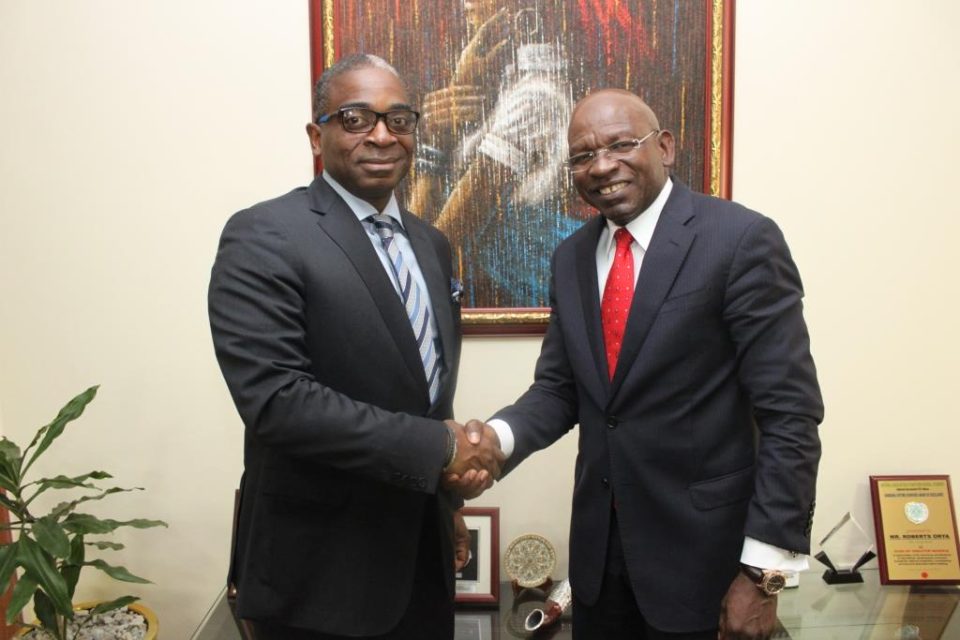
The Nigeria Export Import Bank (NEXIM) is working to develop the ECOWAS and other Africa regional markets as the traditional market for Nigerian exporters with the aim of providing a strong platform for the country’s exporters to venture into the more complex markets of Asia and other developed economies in line with the strategy in other jurisdictions where the export-import banks (EXIM Banks) first developed their regional market.
This is one of the outcomes of the Corporate Transformation that took place since the current leadership of the bank took office in 2009 with the goal of enabling the Bank to have a clear market focus and become a major contributor to non-oil exports. This is in addition to turning it into a world class institution which imbibes best-in-class corporate governance and risk management practices towards becoming a relevant player in the export market with the capacity to significantly influence government trade policies.
Managing Director of NEXIM Bank, Mr. Robert Orya made a review of the activities of the bank while discussing with the newly appointed Executive Director/Chief Executive (ED/CE) of the Nigerian Export Promotion Council (NEPC), Mr. Olusegun Awolowo who paid him a courtesy visit recently. The NEXIM MD provided the NEPC team with a snapshot of NEXIM Bank’s mandate, mission and vision stating that the institution was established by Act 38 of 1991 as an Export Credit Agency with the broad mandate to promoting the diversification of the Nigerian economy away from oil and deepening the external sector.
Mr. Orya stated that upon his resumption in August 2009 as the MD/CEO of the Bank, he discovered that the Bank had completely moved away from its core mandate and veered into lending to both oil and gas resulting in a dismal credit performance and loss of both its Shareholders’ and investors’ confidence. This warranted him to seek the approval of the Bank’s Shareholders to initiate a Corporate Transformation Project (Project Spring) that led to the re-definition of the Bank’s Mission, Vision and Strategic Objectives, with the intention of channelling its resources into the development of four sectors [Manufacturing, Agro – Processing, Solid Minerals & Services]. The MASS sectors were deemed to have high amount of employment and foreign exchange earnings.
Mr. Orya informed his counterpart that NEXIM is facilitating the Sealink Project, which will culminate in the establishment of a shipping company to own and operate ocean-going vessels to boost trade within the West and Central Africa. Accordingly, he invited the NEPC to cooperate with NEXIM in making this project a success hinting that an Investment Memorandum to raise the take-off grant of $60million has been prepared in English and French and the private placement is expected to open before the end of January.
On the outcome of the NEXIM Bank’s transformation initiative, Mr. Orya proudly informed his counterpart, “…we may not have achieved every item of the targets we set in our 5-year strategy plan, but we have completely strengthened our operational processes, instituted the strong pillars of corporate governance, risk management…, turned NEXIM Bank from an obscure, loss-making institution to a highly visible and profit-making institution with a robust balance sheet size….We have consistently made and declared profits for three years in a row now, paying dividends to our Shareholders….That has never happened since the Bank was set up in 1991”
In closing, the MD advised NEPC to review the current provisions regarding the Export Expansion Grant to make it more effective, adding that both NEXIM and NEPC needed to work in close collaboration to boost the current level of non-oil exports which had remained below 4% over the past 5 years.
Thanking Mr. Orya for welcoming his team, Mr. Olusegun Awolowo stated that his choice of making NEXIM Bank his first ‘port of call’ upon resumption was based on what he had keenly observed as NEXIM Bank’s innovative disposition to deepening the non-oil sector and a comment to contribute to President Goodluck Jonathan’s Transformation Agenda and Vision 20:2020.
The NEPC ED stated that he has great confidence in the country’s ability to meet her development goals and commended the initiatives of NEXIM in enhancing the level of formal trade, noting that the study conducted by NEPC revealed that informal trade annually was about $12bn, far more than the formal trade valued at $3billion. He promised that NEPC would work closely with NEXIM to improve the level of trade flows and also improve the trade statistics.
Mr. Awolowo assured NEXIM Bank that the NEPC was already working towards reviewing the Export Expansion Grant and that the review will cover the qualification criteria and other aspects. According to him, “… the new strategic focus will place greater emphasis on market development, with Nigerians in diaspora as major targets….” He noted that that Trade Commissioners have been appointed in major countries including China, Brazil and London to help in developing markets for Nigerian products, especially for the benefit of millions of our Diaspora citizens.
Lauding the phenomenal successes of the NEXIM Bank Corporate Transformation initiative, Mr. Awolowo informed the NEXIM boss that NEPC is also working on human resource realignment to drive export growth, adding that the objective of the new management was to increase the level of non-oil exports by at least 30% in the next 4 years.
In closing, the CEO invited NEXIM Bank to collaborate with NEPC for higher synergies and stressed that both organizations have significant roles to play in developing the Nigerian non-oil exports and that his leadership would encourage and foster even closer collaboration between the two institutions towards supporting Mr. President’s Transformation Agenda and achieving Vision 20:2020
